Mechanical properties of inorganic materials (metals, cerams) and organic materials (polymers, fibres) and composites (material blends, nanocomposites, filled and reinforced systems).
For inorganic materials: microstructure development during deformation, dislocation theory, hardening mechanisms, fracturei, fatigue and creep.
Mechanical testing, enthalpy elasticity, rubber elasticity, viscoelasticity, plasticity, viscoplasticity, fracture properties, deformation velocity and temperature influence. Molecular and morphological influence on the mechanical properties. External influence including moisture, solvents and oxidation.
After the course the student should be abel to:
- fundamental dislocation theory and strengthening mechanisms in metals
- Fracture, fatigue and creep in metals
- how different material parameters and external factors affect the mechanical properties
- which test methods are suitable for measurement of mechanical properties
- difference in influence of static and dynamic stress
- fundamental differences and likenesses between mechanical properties of organic and inorganic materials at small deformations, plastic deformation and deformation to fracture
- influence of time and temperature on the mechanical properties of materials, "time-temperature"
